Many coffee shop industry leaders are breathing a sigh of relief as 2024 rolls on. While it has been a tough few years, many coffee shops and cafe marketing professionals are becoming more robust than their larger competitors.
As you’ll see below, coffee shops operate in an increasingly saturated market, making effective marketing important for attracting new patrons and retaining existing ones.
A well-executed marketing strategy can differentiate a coffee shop business, build brand loyalty, and drive revenue growth.
Whether you run an established chain or a new independent cafe, understanding marketing best practices for the coffee shop industry is essential.
Coffee shop marketing tactics include leveraging various tactics like social media, creating memorable guest experiences, and developing creative promotional campaigns. Implementing proven marketing strategies allows coffee shops to raise brand awareness, reach their target demographics, and position themselves as trusted local businesses.
Competing with larger organizations and other local shops is easier with these low-cost and budget-friendly coffee shop marketing tactics that any location can utilize.

1. Use Artificial Intelligence as a Force Multiplier
Artificial intelligence (AI) has quickly become a prominent player in the hospitality industry, revolutionizing the way coffee shops create and execute their marketing strategies.
Using AI, marketers can utilize guest data to gather both quantitative and qualitative information, better execute their marketing, improve ROI, and engage their guests.
With AI, coffee shops can identify guests who have churned or stopped visiting or making online orders. Then, using marketing automation, a message can be triggered automatically and sent to the guest to lure them back to your place of business.
You can also use AI to discover true customer sentiment. Using online ratings and reviews, AI can determine your voice-of-guest and know what your guests enjoy about your establishment and what your operations need to do to improve.
Use AI for advanced guest segmentation for more personalized and targeted automated marketing campaigns for better ROI.
AI can also quickly suggest responses to online reviews, saving you time and resources that could be spent on more important business-related activities.
Using AI in restaurant marketing can improve the guest experience by helping coffee shops better understand their patrons’ needs and preferences.
As AI technology evolves and becomes more sophisticated, its role in coffee shop marketing will likely expand further, enabling you to deliver even more personalized and compelling marketing messages.
Platforms like Bloom Intelligence implement AI to do all these things and more. Using technology like Bloom saves much time and makes it easier for coffee shops to reach their full potential.
2. Collect and Analyze Coffee Shop Guest Data
Guest data is the lifeblood of successful marketing. Knowing who your guests are and how they behave at your locations and when ordering online is crucial.
Without real guest data, it is impossible to generate the right messaging and target specific messages to specific groups of guests.
Automating the personalization of messaging based on audiences can be done quickly using a restaurant customer data platform (CDP).
A restaurant CDP collects and aggregates guest data into detailed customer profiles, including online and offline behavior, demographics, email, phone numbers, income, ZIP Codes, transactions, and visit/purchase history.
Building this database of guest data is the first step to unlocking unknown customer insights, such as how loyal a guest is, their likelihood to churn, their frequency to your locations, and much more.
For instance, Toast recently released a study showing that YOY breakfast transactions increased by 6% on Saturdays, while decreasing by 2% on Mondays. With this kind of insight for your coffee shop, you might think about running a special on Mondays to increase transactions, or a weekend promotion to further improve sales.
This is just one example of how you can use customer insights to further improve your coffee shop marketing with a CDP.
The best part is that a CDP can automate collecting guest data from multiple customer touchpoints, such as WiFi logins, online ordering, reservation systems, POS systems, website forms, social media, and more.
Then, it becomes possible to begin creating various lists or audiences of your ideal customers, like regulars or high spenders.
Creating these lists (audiences) using customer segmentation, allows you to identify and define your customers categorically. Then, you can group them into segments for personalized marketing, advertising, and other demand-generation activities discussed below.
Aggregating guest data into a customer data platform unlocks more customer insights and can drive tangible results through the personalization or marketing content you deliver to your audiences.
Sophisticated CDPs combine marketing automation and reputation management into one platform.
With a single platform, you can aggregate guest data and use these insights and audiences in your marketing automation and reputation management.
3. Take Advantage of Marketing Automation
Marketing automation refers to creating messages, offers, or surveys configured once and then running automatically, giving you back valuable time to run your business.
- Nucleus Research found that sales productivity grew by 14.5% when businesses used marketing automation software.
- Business.com explains that investing in marketing automation has many benefits, including efficient and centralized data management, task automation, and more specific, targeted, and segmented marketing campaigns.
Marketing automation allows coffee shops to streamline and optimize promotional efforts through automated messaging, emails, SMS, and more.
For coffee shops looking to reach their customer base and drive engagement efficiently, marketing automation offers several key advantages:
Improved Customer Retention
By setting up automated email campaigns, coffee shops can send timely messages to patrons with promotions, special offers, new product announcements, surveys, and other personalized communication.
Automating customer retention emails helps strengthen relationships and incentivize repeat business. Welcome emails for new customers, birthday offers, and drink preference data collection are other ways to leverage automation.
Increased Operational Efficiency
By automating the collection of ratings and reviews from popular rating websites like Google or Yelp, you can use AI to analyze the reviews to gather real-time customer sentiment.
Discover what guests love about your restaurant and what could use more attention. Then, make data-driven operational decisions.
Targeted, Personalized Outreach
Many marketing automation platforms like Bloom use guest data and behavioral tracking, allowing you to segment audiences and personalize marketing messaging. Coffee shops can then automatically deliver highly relevant content tailored to specific guest interests and purchase histories for better engagement.
Consistent Brand Voice
With automated campaigns operating on predetermined schedules and templates, coffee shops can maintain a cohesive brand voice and message across all their marketing channels and websites.
Marketing automation software like Bloom Intelligence provides in-depth reporting to track guest engagement metrics like open rates, click-throughs, conversions (guests returned or ordered online), and ROI for all automated campaigns. This data allows coffee shops to optimize their strategies continuously.
While implementing marketing automation requires an initial configuration investment, it can be made very easy with dedicated customer success teams.
The long-term benefits of saved time, improved operational efficiency, customer loyalty, brand consistency, and quantifiable ROI make it an essential tool for coffee shops to incorporate into their marketing strategy.
Learn more about Bloom’s marketing automation software here.

4. Aggregate Ratings into One Platform and Offer Social Proof
Online ratings and reviews are essential for success in today’s highly competitive coffee shops and cafe marketplace.
Did you know that 70% of consumers look for more than four reviews before they can trust a business? (Bizrate Insights)
No trust means no business. It’s essential to focus on brand reviews by:
- Replying to every single review that your coffee shop receives. Responding shows review-viewers that the brand cares.
- Create automated processes to bring guests who had a negative experience offline so that you can make it right.
- Having processes and feedback loops that effectively increase your star counts over time. Improving your online reviews will directly affect the number of new guests you receive by increasing your discoverability online.
If you are worried about the time and effort required to consistently respond to reviews on various websites, consider using Bloom Intelligence.
With Bloom’s integration with Google, Facebook, Yelp, and TripAdvisor, you can view the individual reviews and the aggregate total of all ratings collected in one place.
With these integrations, all your ratings and reviews will be in one place, where you can quickly respond to them in real time.
Bloom uses AI to generate unique responses to all your online reviews and can be fully automated. Automated and unique review responses using AI, rules, and templates ensure a brand-centric and original response to each review, saving you much time to focus on other aspects of running your coffee shop. Bloom customers report saving upwards of 20 hours a week.
Plus, with powerful reporting features, you can easily identify trends and understand authentic customer sentiment, which can be used to improve operations and craft marketing messages based on your guests’ voices (what they love about your brand).
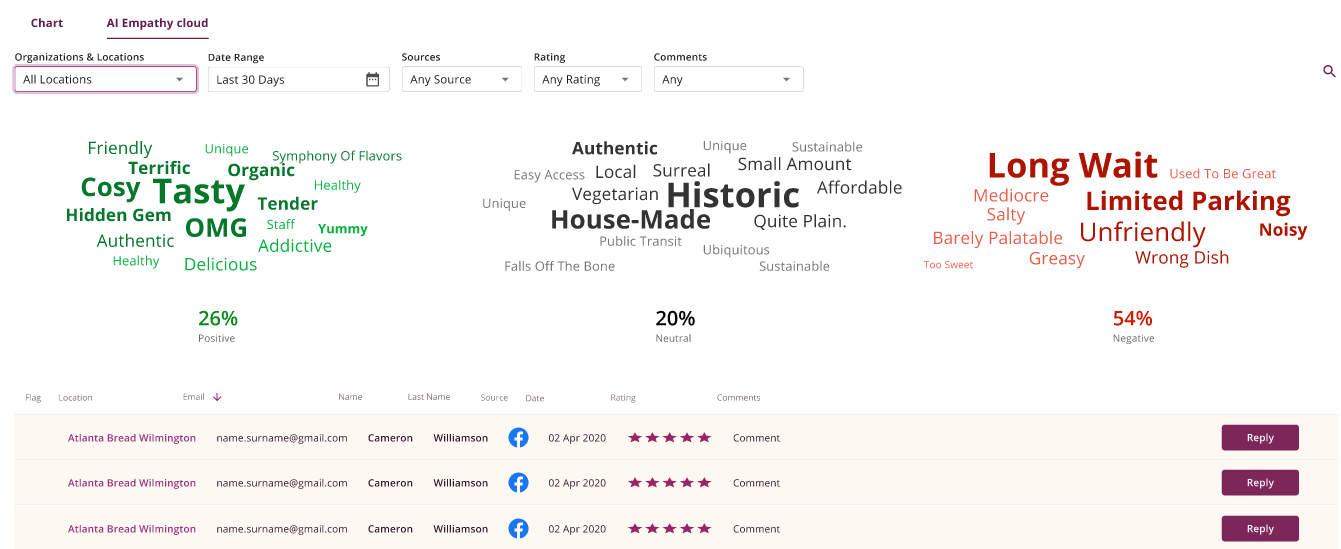
5. Make Delivery an Initiative
Digital ordering and delivery have grown 300% faster than dine-in traffic since 2014.
Adding a delivery model to your coffee shop marketing plan can be a massive undertaking, but brands can start offering delivery by working with third-party delivery services.
The rise of on-demand delivery services like Uber Eats, DoorDash, and Grubhub has created a new marketing channel for coffee shops to reach more customers. Partnering with these apps allows cafes and coffee shops to expand their delivery radius and availability relatively cheaply.
There are several key benefits to utilizing these services:
Expanded Reach
Customers can order from coffee shops far outside a reasonable walking/driving distance, giving coffee shops access to an entirely new pool of potential customers. DoorDash reports that 60% of its orders are delivered over 2 miles away.
Increased Sales Volume
Coffee shops can drive significantly more orders by making their menus available on multiple delivery platforms. Uber Eats found that eating establishments partnered with them experienced an average 25% increase in delivery sales.
Customer Convenience
Delivery allows patrons to get their favorite coffee shop items brought directly to them. This convenience factor can translate into higher order frequency and brand loyalty. 63% of US consumers report using third-party delivery services at least once per month.
Low Risk, Low Cost
Rather than investing in their own delivery drivers, vehicles, and logistics, coffee shops can simply list their menus on established delivery platforms for a commission fee taken per order.
Despite some downsides like fees cutting into profits, data suggests that partnering with UberEats, DoorDash, and similar services is an increasingly important marketing and revenue channel for modern coffee shops. Those who adapt avoid losing out on this growing mobile ordering and delivery segment.
An effective strategy that coffee shop operators use is to leave flyers in all their to-go delivery packages promoting first-party online ordering or even incentivizing guests on their first order through first-party options such as Toast, Olo, Revel, or Oracles Gloria Food.
This way, you will receive all the guest data from these first-party online ordering platforms, allowing you to market to this list of guests for life. Then, on platforms like Bloom, trigger marketing is based on an online order, such as bounce-back offers or surveys.
6. Online Ordering Marketing
Coffee Shop online ordering has become very popular over the last several years, and it shows no signs of slowing down. The pandemic only fed this immense growth.
If your coffee shop offers online ordering to its guests, you are collecting valuable guest data that you could use for your coffee shop marketing campaigns.
By integrating your online ordering system with a CDP like Bloom Intelligence, you can collect and store the data you collect in individual guest profiles.
Then, you can segment your profiles into similar personas and send laser-targeted marketing messages to each group that will engage them much more effectively.
You can also automate these messages based upon “triggers,” such as when they place an online order, leave a rating, if they appear to have stopped ordering online, and more.
As mentioned above, online food ordering has grown 300% faster than dine-in since 2014. If you’re not offering online ordering to your guests, now is the time. Capture and collect guest data to supercharge your coffee shop’s online ordering marketing.

7. Increase Marketing Outreach with Email and SMS Marketing
Email and SMS marketing are two of the most influential and cheapest communication channels for coffee shops to connect with guests.
- Over 90% of adults in the US use email regularly, according to Statista, making it a near-universal platform.
- 70% of consumers want to receive special offers and coupons from restaurants via email and are willing to use them.
- During disruptive events like COVID-19, coffee shops with existing guest email lists could effectively reach loyal patrons even when foot traffic declined.
A robust database of guest email addresses and phone numbers is invaluable for coffee shop marketing initiatives. Here are a few examples:
Re-Engagement of Lapsed Customers
“We miss you” style emails/texts with incentives help win back lapsed customers. Bloom can identify the guests for you, and users are seeing up to 38% of lost guests return.
Saving at-risk guests is significantly cheaper than gaining new ones.
Promotion of New Menu Items or Offers
Email and SMS campaigns can be used to announce and build excitement for new seasonal drinks, food offerings, and other promotions.
Send Special Offers and Coupons
As mentioned above, guests want to receive deals from restaurants. Sending exclusive discounts and promotions can drive more visits and purchases.
An effective marketing technique is giving away food or drink so that new possible guests or existing guests can try your new menu items. Brands like Chick-fil-A attribute their free chicken sandwich cards as an integral part of their success.
Find food or drink items to celebrate, like coffee on National Coffee Day, and then send an offer to your guest lists for a free coffee or free coffee with the purchase of a pastry, or even bring a guest and get a free coffee.
Using food as part of your coffee shop’s marketing strategies will build brand loyalty, bring in new guests, and be extremely effective.
News and Event Communication
Sharing happenings like live music schedules, community events, and more keeps patrons informed.
The payoff is that your coffee shop will remain top of mind with your guests, building sustainable loyalty, word of mouth, and new and repeat business.
Data shows that it costs seven times more to acquire a new customer than to retain an existing one. Coffee shops can take advantage of this by nurturing their valuable guest relationships through email and SMS.
Bloom Intelligence helps you quickly build your guest database by collecting customer information at multiple touchpoints, such as WiFi logins, website forms, POS systems, reservations, and online ordering systems.
Then, you can segment your customer database into various personas and send laser-targeted marketing messages to each segment – all on autopilot.
When executed properly, email and SMS have low costs and high ROI potential compared to most marketing channels. Coffee shops can leverage guest data for automated, personalized messaging that engages their audience and drives brand loyalty while saving money compared to other marketing tactics.

8. Use First-Party Data for Your Coffee Shop Online Advertising
In 2024, Google will eliminate cookie-based ad targeting. This means that ads cannot be targeted toward specific guests—or lookalikes—with a cookie on the user’s device.
If you have a first-party data guest database that you can leverage to do retargeting or look-a-like campaigns.
With a quality restaurant CDP like Bloom, you can passively collect limitless first-party guest data. Then, you export your guest database and upload it to Google and Facebook.
Google and Facebook will analyze the guest data you upload and send your targeted ads only to those on your guest list.
- According to Signifi Media, remarketing ads’ average click-through rate (CTR) is ten times higher than regular display ads.
- The average CTR for retargeted ads is 0.7% compared to 0.07% for regular display ads.
- A CTR of 0.7% is a significantly better conversion rate compared to other digital advertising strategies, which could make a meaningful difference in restaurant and retail ROI.
To increase effectiveness further, you can segment your list and create targeted ads for various groupings of your guests.
Google and Facebook also allow you to create lookalike campaigns. After analyzing your guest data, they will serve your ads only to those with demographics and attributes similar to those on your list.
With segmentation, you can create lists of patrons with similar demographics and behaviors and then create ads that speak directly to those personas. Segmentation will significantly improve engagement and marketing ROI.
9. Hone Your Email Marketing
Growing your email subscribers is the lifeblood of your business and is essential for your coffee shop marketing efforts and a healthy bottom line. The more potential guests you have in your CDP, the more opportunities you create to build relationships, share promotions, and create demand when you need it the most.
Remember, your email strategy keeps your coffee shop at the forefront of your customers’ minds, fosters relationships with new and loyal customers, and keeps your brand top of mind in your local community.
Therefore, focus on optimizing your email marketing in 2024. Providing free WiFi for your customers can be an excellent strategy for gaining new subscribers to your guest lists.
Use WiFi access to direct users to a captive portal or WiFi landing page to collect their email addresses before they go online.
You’ll quickly gather valuable information that can fuel your entire digital strategy.
You can also gather email addresses using your online ordering, website forms, and reservation systems, and Bloom can do this automatically for you.
Rather than just sending sales and promotional content, nurture your leads by offering value your audience can use. Think about your target market and the common problems they experience or the perks they enjoy. Share resources and answer their questions.
They will see your coffee shop in a whole new light!
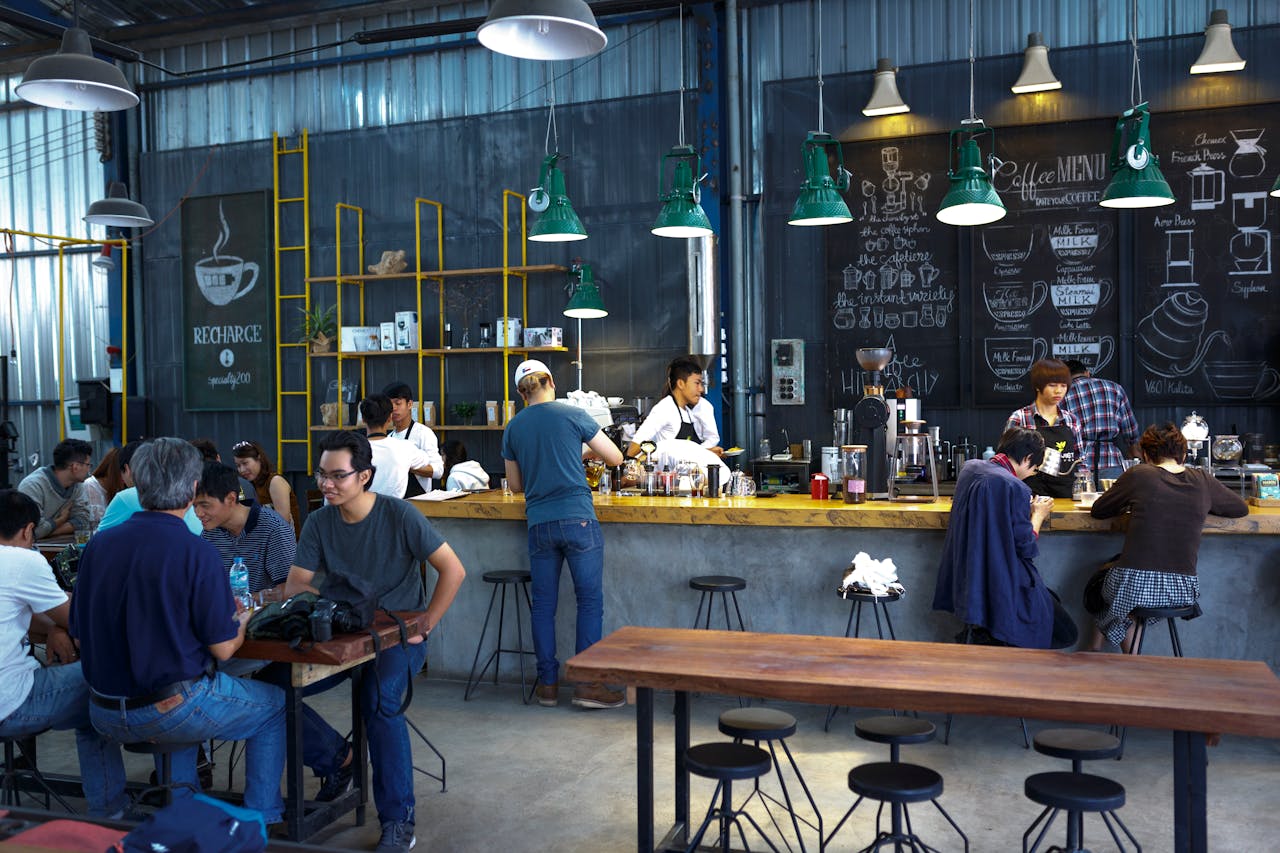
10. Evaluate Core Demographics to Ensure Branding Success
Many managers in the food & beverage industry are unaware of the average age of their guests. Likewise, they don’t know specifically whether most of their guests are male or female or how far away their guests are coming to frequent their establishments.
Coffee shop owners should know the answers to these questions to create and maintain a strong brand presence and to make the correct operational decisions.
These answers can determine a brand’s look, a location’s environment, the music playing, delivery radius, new location placements, and overall culture. After all, a brand is about the consumer.
With Bloom Intelligence, coffee shops can create detailed customer profiles to understand better who their guests are, how they behave, and what they like. You’ll have an extensive, quickly growing customer database with clean, verified data.
You’ll not only know guest demographics but also spot trends in guest behavior. Guest insights will allow you to optimize your coffee shop and cafe marketing ideas over time to create a more engaging and memorable guest experience.
Learn more about restaurant marketing plans here.
11. Consider Subscription Services for Your Coffee Shop
Of those who drink coffee in the US, the average coffee drinker enjoys 3.1 cups daily.
Coffee drinkers are also willing to pay more for products from local coffee roasters. Consumers will spend up to $25 per pound, compared to a maximum of about $20 per pound from a non-local high-end roaster.
Many cafes and coffee shops are turning to monthly subscription services.
Subscriptions improve relationships because brands connect with customers more often.
- They introduce up-sell opportunities.
- They provide recurring revenue.
Subscriptions can be a great way to improve guest loyalty and increase overall customer lifetime values.
COVID-19 transformed the way that cafes and local coffee shops operate.
Customers are much more comfortable ordering for pickup or delivery, and many coffee shops need help attracting this business. As a result, many coffee shops turn to subscription-based coffee services for their patrons.
One type of subscription service involves providing an unlimited amount of coffee for a set monthly cost.
Another coffee shop subscription service might entail providing customers with packaged coffee beans delivered to their homes. More than half of online shoppers (54%) subscribe to a subscription box service. The subscription box industry appeals to consumers’ desire for convenient, novel experiences.
Be creative with your subscriptions, learn what your customers prefer, and see which ones work best for your shop.
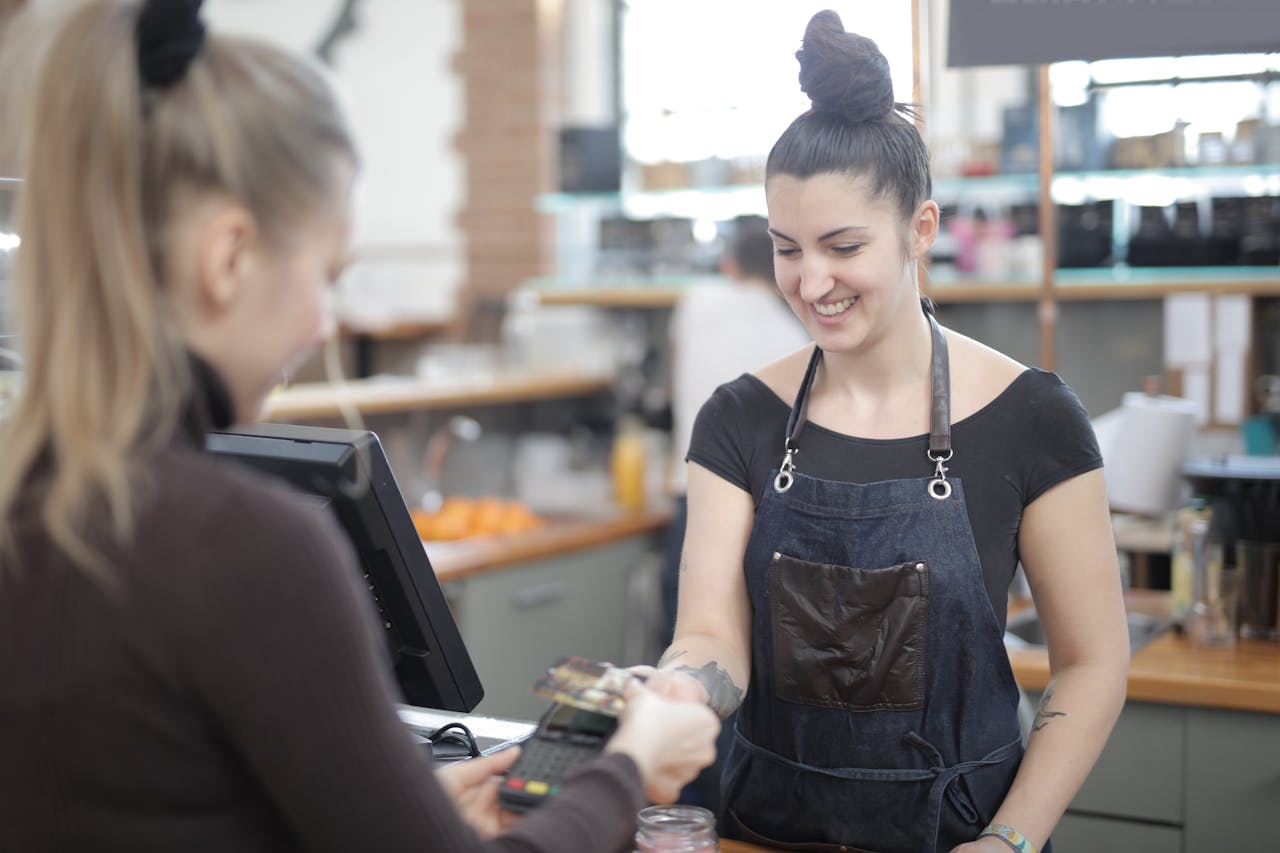
12. Live Video is a Must
Live video can play a decisive role in building awareness and relationships on social media. Tools such as Facebook Live and Instagram Stories capture attention and encourage followers to connect more with cafe brands. Likewise, they help build customer loyalty.
In fact, according to Forrester, people watch live videos 10 to 20 times longer than on-demand content, making live streaming a compelling way to deliver interactive content to consumers. Incorporating live video into your coffee shop marketing strategy can engage your followers more and increase brand awareness.
Coffee shop owners can use live video in social media marketing in several ways. Here are a few ideas:
- Take your social media followers behind the scenes to show them what it’s like to prepare a cup of coffee and other foods in your shop.
- Highlight your coffee shop team on live video so customers can get to know them. Implement an employee of the month contest and feature your winners.
- You can promote your new flavors and share why people will love them. You can also communicate why you decided to add them to your coffee menu.
- Use AI to create short-form videos of guests interacting with their coffee.
This interactive content encourages audience participation through comments and shares, expanding the coffee shop’s reach. Properly using live social video allows coffee brands to cultivate a dedicated online following of loyal customers who feel invested in the café’s identity and culture.
13. Ramp up Your Coffee Shop’s Instagram Strategy
Instagram remains one of the fastest-growing social networks, boasting over one billion users.
It’s an ideal platform for attracting new followers and customers to your coffee brand while showcasing your creative side. It is essential to stay up-to-date on the best social media marketing campaigns for your coffee shop.
Remember these tips to amplify your Instagram strategy in your coffee shop social media marketing:
- Hashtags are king on Instagram! If you’re not already using them, include popular and industry-related hashtags in your content. You can use tools like Hashtagify.me to find relevant ones and drive new followers to your page.
- Be responsive. Remember, this is a social media platform. Replying to comments and online reviews and reposting others’ content is a sure way to maintain engagement on Instagram. It also humanizes your brand, making you more relatable and personable.
- Share useful content. How-to videos and motivational posts are a hit on social media. Leverage them to your advantage while offering value to your audience.
- Make sure your visuals are high-quality, as they perform better on Instagram.
- Use fantastic, high-definition food and drink pictures.
- Be consistent. If you can only post twice daily, maintain that cadence for improved engagement.
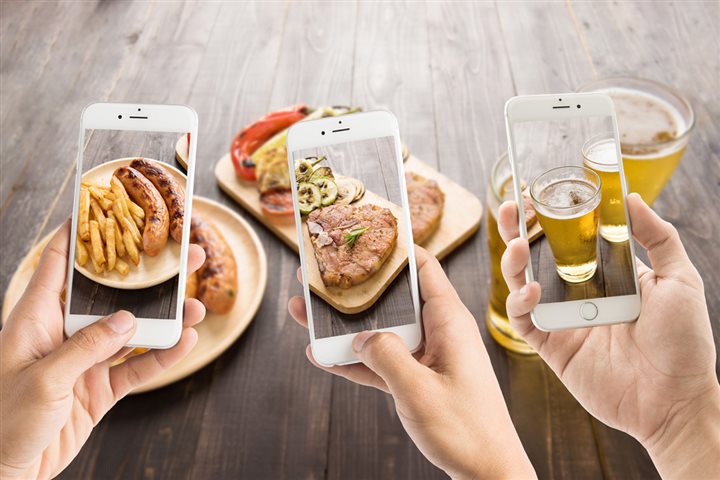
14. Leverage Interactive Content in your Coffee Shop Marketing
In 2024, remember that consumers do not interact with content the same way they did in the past. Techniques like blogging and social posts still work, yet followers seek more engaging experiences.
Additionally, offering multiple ways for people to consume your content allows you to reach a bigger audience.
Engaging content for your coffee shop is important. That’s where interactive content and digital marketing come into play. Formats such as quizzes, assessments, surveys, and polls are excellent ways to entertain and engage your followers.
Even as a coffee shop, you can think of creative ideas to leverage interactive content in your digital marketing strategy.
For example, create a quiz using interactive content tools like Apester, where users discover their “Coffee Personality Type.” Or, build a poll asking social media followers about their favorite coffee or specialty tea. You could also develop a survey to discover more about your consumers and what they want to improve your customer initiatives.
The options are endless with interactive content.
Bloom Intelligence allows users to send polls and surveys to their customers or segments. Simply configure the campaign and turn it on. Bloom will automatically email the surveys to your guests whenever they meet your inclusion criteria. All you have to do is monitor the results and make data-driven operations and menu decisions to correct what’s wrong and reinforce what’s working.
15. User-Generated Content Sells
User-generated content is one of the most effective forms of content in marketing. It is powerful and, more importantly, free.
Your guests’ comments, selfies with your products, testimonials, and videos provide you with valuable content to implement in your coffee shop marketing. Social proof and reviews sell.
The Nielsen Consumer Trust Index shares that 92% of consumers trust organic, user-generated content more than they believe in traditional advertising. This trust plays a massive role in generating buzz on social media and getting more people into your coffee shop.
With that being said, encourage your patrons to leave positive reviews on your social media accounts and Google. Make it easy by using Bloom’s marketing automation to send a direct link where they can click and write. Consider hosting a contest where each participant shares a social media post about their experience with your brand.
The key is to collect as much user-generated content as possible to amplify your overall digital marketing strategy. This can also help build your word-of-mouth marketing.
16. Harness Influencer Marketing
In the fast-paced world of coffee shop marketing, influencer marketing presents an excellent opportunity for coffee shops to connect with a more engaged audience.
By collaborating with influential personalities who resonate with your target coffee enthusiasts, you can amplify your brand’s visibility, cultivate trust, and attract new customers through the doors.
The success of influencer marketing relies on identifying the right influencers who closely align with your coffee shop’s values and offerings. Local bloggers, Instagram foodies, and lifestyle influencers with a substantial following in your area can be excellent partners.
Analyze their content, engagement rates, and audience demographics to ensure a seamless match.
Once you’ve identified potential influencers, create collaborations that allow them to authentically showcase your coffee shop’s unique atmosphere and exceptional brews.
Then, invite them for a complimentary tasting experience, encouraging them to share their genuine impressions through visuals and honest reviews. You could also sponsor giveaways or contests on their platforms, offering their followers exclusive discounts or coffee-themed experiences.
Remember, transparency is important in influencer marketing. Both you and the influencer should disclose your partnership to maintain trust and credibility with the audience. Provide influencers with accurate information about your coffee shop, signature drinks, and unique offerings to ensure their content accurately represents your brand.
Well-executed influencer marketing campaigns can amplify your coffee shop’s presence, attract new customers, and foster a loyal community of brand advocates. By strategically leveraging the power of influential voices, you can supercharge your coffee shop’s marketing efforts and stand out in a crowded market.
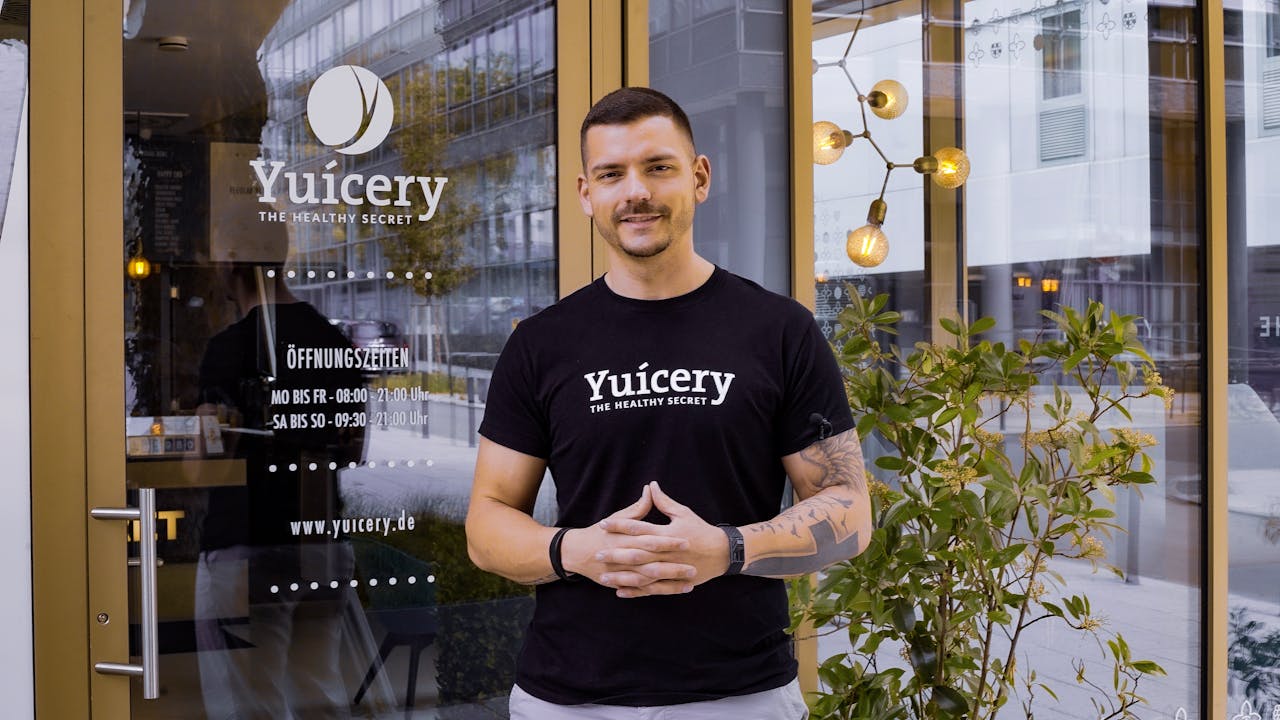
Other Key Coffee Shop Statistics to Keep in Mind
- Coffee statistics show that the average American consumes 3 cups of coffee per day.
- The typical and most committed coffee drinkers are 25 to 45-year-old, affluent, educated adults.
- According to Business Valuation Marketing, the top 50 coffee shop companies have captured around 70% of the US market.
- The US coffee shop market has grown significantly, reaching over 40,000 stores, representing a 7% increase from pre-pandemic levels. The overall market value grew by 8% over the past year, reaching $49.5 billion.
- The coffee market in the US is the largest globally, generating an annual revenue of approximately $80 billion.
- Cold coffee beverages are becoming increasingly popular, particularly among younger consumers. Daily consumption of iced coffee rose by 8% in the past year. Specialty and gourmet coffee drinks also continue to gain popularity, especially among millennials, who favor these over traditional drip coffee.
- The pre-ordering and online ordering trend has become more widespread, even among independent coffee shops. The pandemic accelerated this shift, which has continued as consumers appreciate the convenience.
- Non-dairy options like oat milk have surged in popularity, with sales growing by 55-58% in the past year. This trend is driven by dietary preferences, lactose intolerance, and a general shift towards plant-based diets.
Implementing intelligent digital marketing tactics in your coffee shop marketing plan will position you well in 2024 and beyond. It’s essential to continuously test your efforts to keep what’s working and modify what isn’t. With consistency, you’ll create a winning strategy that keeps people connected to your brand online and offline and drives new customers through your doors.
Now is the time to plan for a healthier future for your coffee shop or cafe.
To learn more about how Bloom Intelligence can help with your coffee shop marketing, call us today at 727-877-8181 or click to schedule a free online demo.


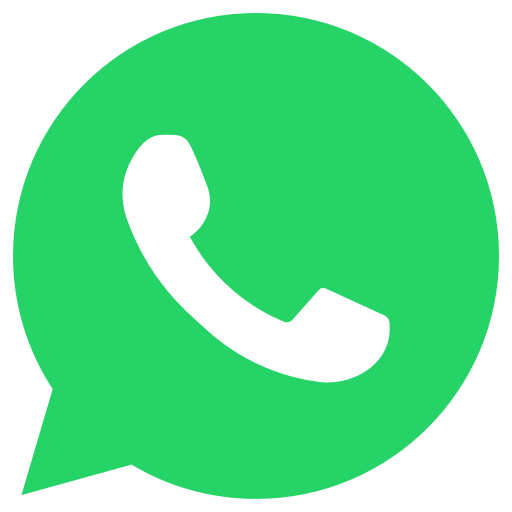
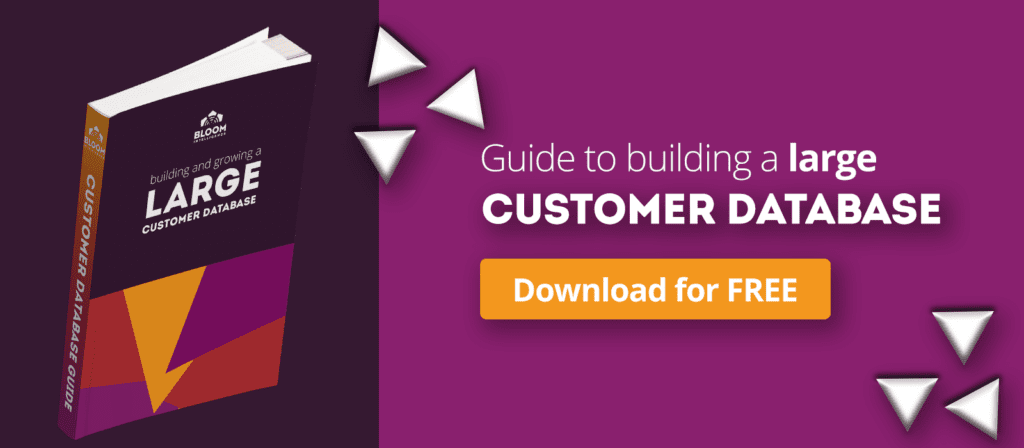

.svg)